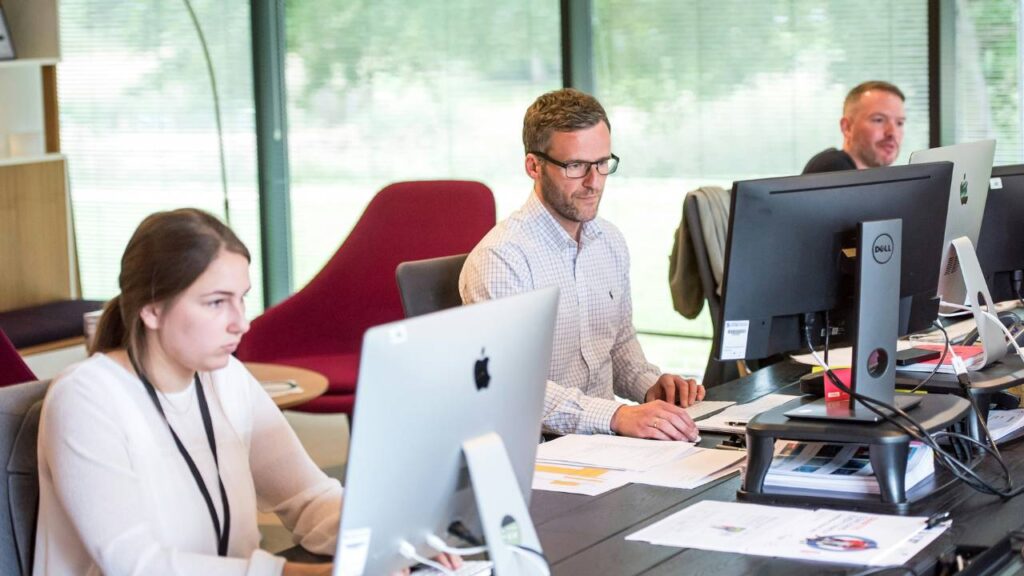
As the business landscape evolves at an unprecedented pace, it’s increasingly important to ensure that your business premises can stand the test of time. Future-proofing your property doesn’t just protect your physical assets; it also serves as a vital strategy for maintaining operational efficiency and resilience in the ever-changing marketplace. This requires thoughtful consideration of how your spaces can adapt to new technologies, changes in work patterns, and the evolving expectations of both customers and employees.
To successfully future-proof your business, you need a proactive approach that considers potential advancements and challenges. This could range from implementing flexible working spaces to accommodate a hybrid workforce, to upgrading infrastructure for better connectivity. Investing in sustainable and energy-efficient technologies can also play a significant role in not only reducing operational costs but also in showing your commitment to environmental responsibility, which is becoming increasingly important to consumers and stakeholders alike.
Embracing a long-term perspective when planning and investing in your business premises can help mitigate the risk of obsolescence. By considering what the future might hold and how your business can continue to provide value amid those changes, you uphold an agile and forward-thinking mindset. This enables you to navigate future transformations smoothly, ensuring your business remains competitive and relevant in a rapidly advancing world.
Embracing Technological Advancements
To stay competitive, your business needs to adapt to technological progress quickly. Embracing technology means more than just staying current; it involves actively integrating the latest innovations to enhance your company’s operations.
Integration of AI and Automation
Incorporating Artificial Intelligence (AI) and automation into your business systems can significantly boost productivity. You might consider automating routine tasks, like customer service inquiries, using AI chatbots, which saves time and allows your team to focus on more complex issues. Moreover, AI can assist in optimising your supply chain management, minimising costs, and reducing errors.
Investing in Ecommerce Platforms
Ecommerce platforms are essential for extending your market reach and understanding customer behaviour. A robust platform can handle increased traffic, scale with your business, and offer a seamless shopping experience. Your investment in this technology not only meets customer expectations but also provides a wealth of customer data, enabling you to tailor your product offerings effectively.
Utilising Data Analytics
Data analytics harness the power of big data, turning customer data into actionable insights. These systems analyse patterns and trends, allowing you to make informed decisions and to strategise more effectively. Whether you aim to improve marketing efforts or streamline operations, utilising the insights gained from data analytics can lead to significant competitive advantages.
Ultimately, many of these strategies play a role in creating the ultimate smart office – an environment that is not only digitally connected but also highly efficient, sustainable, and adaptable to future needs. By combining innovation with practicality, you build an infrastructure that can support both immediate productivity and long-term business evolution.
Understanding and Adapting to Market Trends

In order to future-proof your business premises, it’s essential to stay abreast of evolving market trends and customer expectations. This adaptation involves continuous research and the strategic realignment of your business practices.
Analysing Post-Pandemic Consumer Behaviour
Since Covid-19, you have witnessed a significant shift in consumer behaviour. Research indicates that customers now prioritise convenience, health, and hygiene more than ever before. Your business should incorporate enhanced safety measures, offer flexible shopping options and ensure these changes are clearly communicated to customers. For instance, the implementation of touchless transactions has transitioned from a novelty to almost a necessity in a post-pandemic world.
Tracking Economic and Cultural Shifts
Keeping tabs on the economy and culture is just as critical. Shifts in these areas directly influence market dynamics, consumer priorities, and, consequently, competition. Observe economic indicators such as consumer spending patterns and employment rates, which reflect the broader economic health and will guide your business decisions. Similarly, cultural trends, notably shaped by millennials, emphasise sustainability and ethical consumption – values that your business would benefit from integrating into its operations and marketing strategies. Adapt to these trends to maintain relevance and competitive advantage.
Expanding Premises for Future Growth

When considering how to expand your business premises for future growth, it’s crucial to think strategically about the space you’ll need. Shomera Ireland is an example of a company that understands the importance of creating additional space that not only meets present needs but also anticipates future expansion.
First, assess your current premises and identify areas where space could be maximised. This might involve modifying existing structures or building entirely new extensions. Remember that any extension should offer flexibility to adapt to changing business needs. Here’s how you can plan:
- Evaluate your growth projections – Estimate the additional space required based on your business forecasts. Consider consulting with architects who have a track record of designing scalable business environments.
- Design for adaptability – Choose designs that allow for easy alterations. For example, Shomera Ireland emphasises the use of modular designs that can be adjusted or expanded with minimal disruption.
- Incorporate technology – Ensure that your expanded premises are outfitted with the latest in smart technology to facilitate communication and operations.
The leeway for incorporating future technologies is essential. Allocate areas in your premises for emerging tech, such as augmented reality for product demonstrations or electric vehicle charging stations.
To sum up the financial aspect, a detailed cost analysis is imperative. Consider the return on investment for expanding your premises and explore funding options, including loans or leasing arrangements for the extra space. Your financial planning should also include forecasts for maintenance costs of the new areas.
By planning for future growth and incorporating these strategies, you’ll prepare your business to adapt and thrive in an ever-changing marketplace.
Strengthening Customer Experience
By focusing on improving your online presence and providing exceptional customer support, you can significantly enhance the interaction customers have with your business. This is crucial in a world where customer experience can make a big difference to your success.
Improving Online User Experience
Your website serves as the digital facade of your business. It’s imperative that you make navigation intuitive and the overall layout visually appealing. You can optimise your site by analysing customer data to understand user behaviour. This may involve restructuring your site’s architecture to streamline customers’ paths to their destinations within your website.
Keep an eye on trends in web design that resonate with your audience and incorporate them where appropriate. For instance, if surveys show that your customers prefer a particular feature, prioritise the integration of this feature.
Ensure that all the touchpoints on your online platform are responsive and that content is accessible on a variety of devices. Tailoring the content to users’ needs and providing a seamless web experience will encourage them to return.
Enhancing Customer Support Services
To deliver excellent customer support, start by understanding the common issues your customers face. This information will guide you to create a comprehensive FAQ section and equip your support team with the right resources.
Employing a robust Customer Relationship Management (CRM) system allows you to store detailed customer interactions, making it easier for your team to provide personalised support.
Adopting Customer Support software that includes live chat and ticketing systems can provide your customers with immediate assistance. Regularly conducting customer surveys can provide insights into where your customer service can be improved and help you to keep up with changing customer needs.
Remember, every interaction customers have with your business shapes their overall experience. By continuously refining your online user experience and customer support services, you’re more likely to build lasting relationships with your customers.
Building a Future-Ready Workforce

To thrive in an ever-evolving business landscape, your organisation must cultivate a workforce that’s adaptable, skilled, and ready to embrace new challenges. Success hinges on your dedication to embracing employee well-being, nurturing a culture of continuous learning, and investing in the development of your talent and leaders.
Fostering a Culture of Continuous Learning
You can’t underestimate the value of creating an environment where learning is part and parcel of daily work. It’s imperative that your team members engage in ongoing professional development to keep pace with industry advancements. By incorporating educational programmes and opportunities for skills enhancement directly into the employee experience, you foster a workplace where innovation isn’t just encouraged—it’s expected.
Your HR function plays a pivotal role in this. It executes strategies that integrate learning into the very fibres of your organisation’s culture. For instance, setting aside time for workshops or sponsoring certifications and courses shows you’re committed to your team’s growth. When you champion diversity in problem-solving and knowledge sharing, you create a rich tapestry of perspectives that can fuel innovation across all operations.
Investing in Talent and Leadership Development
Investing in your human capital is non-negotiable if you aspire to have a robust execution of business strategies. Talent development starts with hiring a diverse workforce and extends to supporting them through mentorship and leadership programmes. This strategic approach not only prepares individuals for future roles but also strengthens your organisation’s backbone.
Effective leadership development will require you to identify potential leaders early and provide them with tailored training that aligns with your company’s values and goals. Consider involving them in cross-functional projects to hone their strategic thinking and problem-solving capabilities. By doing this, you enable your workforce to lead by example and drive the cultural and organisational changes necessary for lasting success.
Financial Planning for Sustainability
When considering financial planning for your business, integrating sustainability practices is crucial for long-term survival. Your investment in sustainable resources isn’t just ethical; it’s also economically prudent, particularly facing uncertainty.
- Cash Flow Management – Anticipate green upgrades as part of your future outflows. They can appear substantial but remember they often lead to long-term savings. Foster efficient operations that steadily reduce your expenses. Mitigate risks by creating a cash flow forecast that includes sustainability-oriented actions.
- Investment in Sustainable Assets – Allocate funds towards energy-efficient equipment or renewable energy sources. This strategy not only aligns with eco-friendly initiatives but can also result in decreased utility bills. Over time, such investments could prove less volatile and more beneficial for your company’s stability.
- Long-term Planning – Sustainability efforts often require you to think long-term. While immediate costs can be higher, future savings and the potential for government incentives are worthwhile. Prioritising durability over disposability in equipment choices might incur higher upfront costs, but you’ll reap benefits in maintenance savings and longevity.
- Resilience Against Uncertainty – By adopting sustainable practices, you’re preparing your business to adapt to regulatory changes and market shifts towards green policies. This adaptability is a safeguard against unforeseen sustainability demands.
Crafting a sustainability-focused financial plan is more than just good sense; it’s placing your business on a foundation that values resilience and adaptability. Your financial choices today are steps toward a robust and enduring business.
